Ev battery
Maruti Suzuki Plans Extensive EV Charging Infrastructure Ahead of eVX Launch
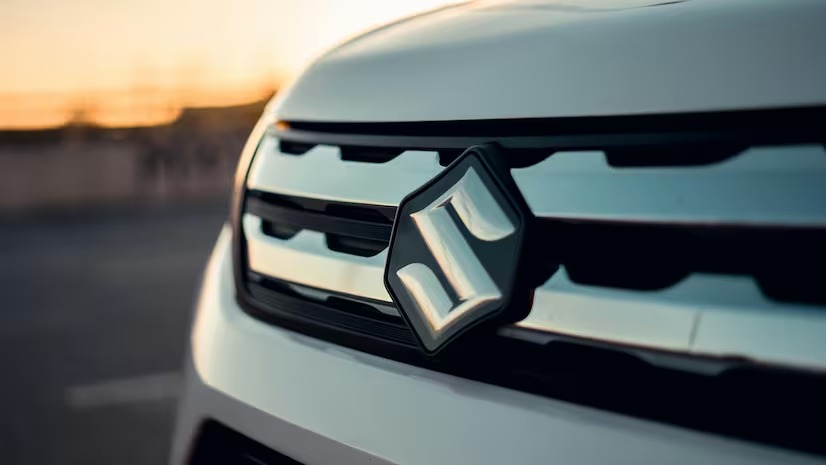
Charging Stations and Infrastructure Development
Maruti Suzuki is set to enhance the electric vehicle landscape in India by establishing approximately 25,000 EV charging stations. This initiative comes ahead of the launch of its first electric vehicle, the Concept eVX, aimed at addressing the growing demand for electric mobility.
The company will utilize its extensive network of over 5,100 service centers located in 2,300 cities. Collaborations with oil and energy companies are underway to build a robust charging infrastructure. This infrastructure is crucial, as the lack of charging facilities has been identified as a major barrier to the adoption of electric vehicles in the country.
Training and Support
To ensure effective support for the charging stations, Maruti Suzuki has begun training service mechanics in Bengaluru. This training aims to equip them with the necessary skills to assist customers with EV-related services and charging solutions. The company’s proactive approach includes surveying dealer workshops to identify locations for dedicated charging points. Plans are in place to install at least one dedicated charging bay and two charge points at each service center.
Pricing and Sales Goals
The pricing strategy for the eVX positions it between Rs 20-25 lakh, making it accessible within the midsize SUV segment. A sales target of 3,000 units is set for the first three months post-launch, indicating strong confidence in market reception.
Manufacturing and Distribution
Manufacturing of the eVX will occur at the Gujarat plant, with distribution planned through premium Nexa outlets. This strategic approach ensures that customers have a seamless purchasing experience and access to quality after-sales service.
Future Plans and Market Challenges
The eVX represents the first step in Maruti Suzuki’s ambitious plan to launch a total of six electric vehicles over the next 6-7 years. This commitment highlights the company’s dedication to transitioning towards sustainable mobility solutions.
Despite these positive developments, challenges remain in India’s electric vehicle market. Recent reports indicate a 10% decline in EV sales year-on-year, attributed to factors such as limited charging infrastructure, range anxiety, and high upfront costs. These issues must be addressed to foster greater acceptance of electric vehicles among consumers.
Competitive Landscape
In comparison, competitors are also expanding their charging networks. Tata Motors has established 5,600 public charging stations, while Tata Power Renewable Energy has installed over 101,924 home charging points. These efforts demonstrate a competitive landscape focused on enhancing EV infrastructure.
Conclusion
Maruti Suzuki’s initiative to set up extensive charging stations is expected to contribute significantly to the growth of the electric vehicle segment in India. By addressing the concerns of potential EV owners and improving the charging ecosystem, Maruti aims to build customer confidence in electric mobility.
The launch of the eVX, along with its extensive charging network, positions Maruti Suzuki as a key player in the transition to electric vehicles in India. As the market evolves, ongoing efforts will be needed to overcome challenges and promote the adoption of electric vehicles across the country. With its strategic plans in place, Maruti Suzuki is poised to lead the charge in India’s electric vehicle revolution.
Article By
Prashant Sharma
Blog
Suzuki Access EV: A New Electric Scooter Set to Compete with the Honda Activa Electric
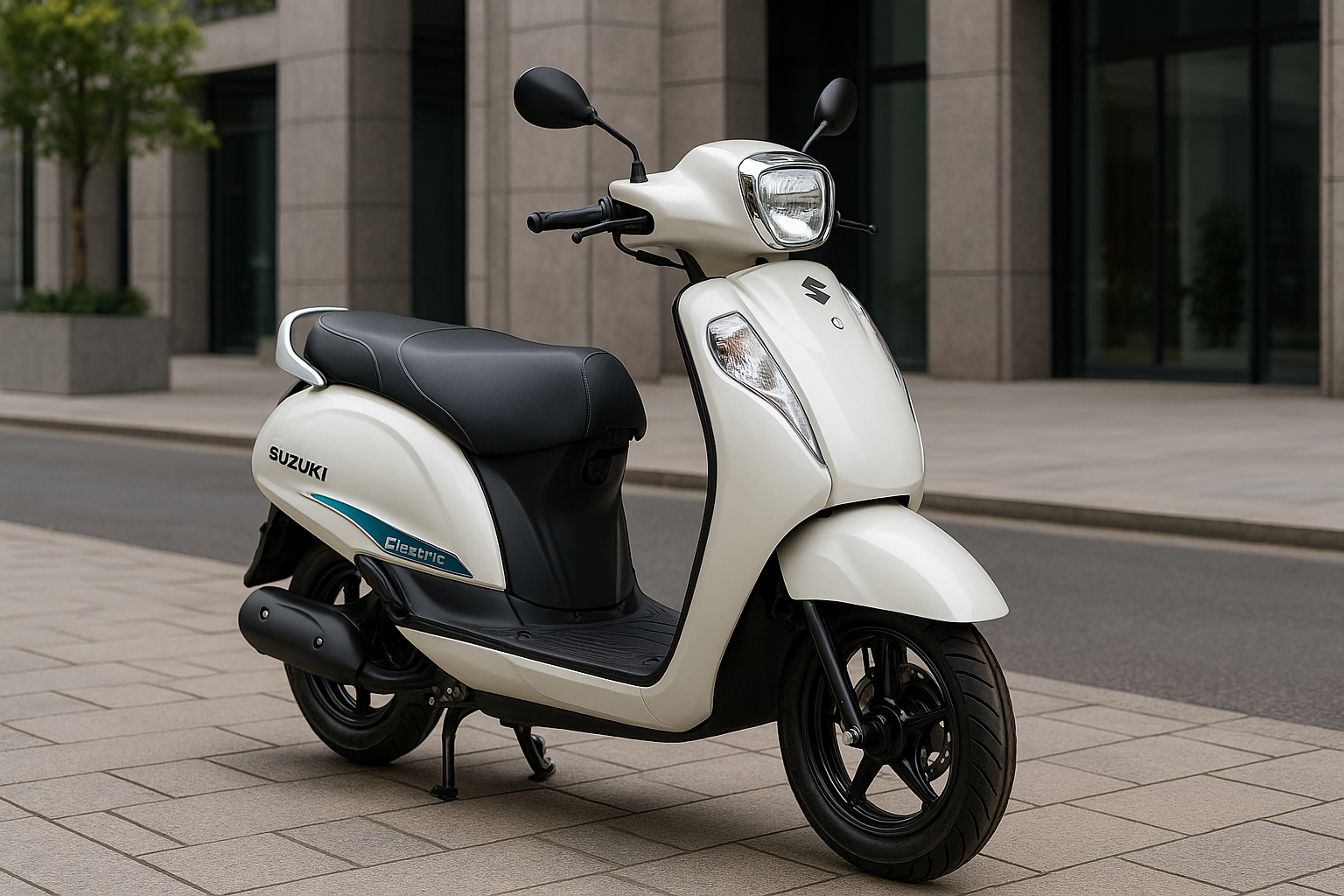
Suzuki Enters the Electric Scooter Market with the Access EV
Suzuki, a brand renowned for its reliable and fuel-efficient motorcycles and scooters, is now entering the world of electric mobility with its upcoming Suzuki Access EV. Expected to launch in 2025, this electric scooter is poised to become a significant player in India’s rapidly growing electric two-wheeler market. With the rise in demand for eco-friendly transportation, Suzuki aims to tap into the shift toward electric mobility with a scooter that combines familiarity, affordability, and modern electric technology.
India’s electric scooter market is heating up, with strong contenders like the Honda Activa Electric also making their debut. The Suzuki Access EV has big shoes to fill, but with its established reputation in the two-wheeler segment, Suzuki is well-equipped to make its mark.
Key Features of the Suzuki Access EV
1. Sleek Design and Comfort
The Suzuki Access EV will retain the classic design elements that made the Access 125 one of India’s most popular scooters, while incorporating sleek, modern changes suitable for the electric age. Expect a design that maintains the comfort and ease of use for which the Access series is known, but with enhancements to accommodate electric powertrain components.
The Access EV will come with a well-designed, comfortable seat, spacious footboard, and ergonomic riding posture, ensuring that it’s just as comfortable for long-distance commutes as it is for short city rides.
2. Battery and Range
One of the biggest concerns for any potential electric vehicle buyer is the range. The Suzuki Access EV is expected to come with a high-capacity lithium-ion battery that offers a respectable range of 80 to 100 km on a single charge. For daily city commuters, this range should be more than sufficient, offering the convenience of not needing to charge the scooter every day.
The Access EV will also feature quick charging capabilities, so riders can spend less time plugged into a charging point and more time on the road. Suzuki aims to make it as convenient as possible for users, whether they’re commuting or running errands.
3. Smart Features and Technology
In addition to its design and range, the Suzuki Access EV will come with a range of smart features to enhance the rider experience. Expect connectivity options that allow you to pair your phone with the scooter for features like real-time vehicle tracking, remote diagnostics, and battery status updates. LED lights, digital instrument clusters, and regenerative braking systems will also be part of the package, offering a smooth and high-tech riding experience.
How the Suzuki Access EV Will Compete with the Honda Activa Electric
The competition in the electric scooter segment is heating up with Honda’s Activa Electric, which is expected to launch around the same time as the Suzuki Access EV. Both brands have loyal customer bases, and their electric scooters will likely appeal to different segments of the market.
While the Honda Activa has been the undisputed leader in India’s scooter market, Suzuki brings a different set of strengths to the table. The Access EV will likely be priced competitively, giving it a strong chance of becoming a popular choice for those who want the reliability of Suzuki but are also looking for something environmentally friendly and cost-effective.
In terms of performance, both the Access EV and Activa Electric will be aiming for similar performance benchmarks, including good battery life and reliable city range. However, Suzuki’s reputation for durable scooters, combined with the added benefit of an electric motor, could give the Access EV an edge in terms of customer loyalty.
The Impact of Suzuki Access EV on the Electric Scooter Market
As the electric vehicle market in India continues to grow, the introduction of the Suzuki Access EV is a significant step forward. With government incentives for electric vehicles and growing consumer interest in eco-friendly commuting options, electric scooters are becoming a mainstream choice for many people.
The Suzuki Access EV is expected to be a game-changer in making electric scooters more accessible, affordable, and practical for the everyday commuter. By focusing on a user-friendly design, affordable pricing, and efficient battery technology, the Access EV will appeal to a wide range of customers, from those making the transition from petrol scooters to those buying their first electric vehicle.
The Future of Electric Scooters in India
The Suzuki Access EV marks a bold new step for the brand as it enters the growing world of electric mobility. With its solid reputation, affordable pricing, and smart features, the Access EV has the potential to be a strong competitor in the market alongside other popular electric scooters like the Honda Activa Electric.
As 2025 draws closer, we’ll be seeing more affordable electric options like the Access EV, which will make cleaner, greener transportation even more accessible for all. It’s an exciting time for the Indian electric vehicle market, and the Suzuki Access EV is ready to be a part of the future of eco-friendly commuting.
Ev battery
Mahindra Expands EV Portfolio with the BE 07: A New Era of Electric Mobility
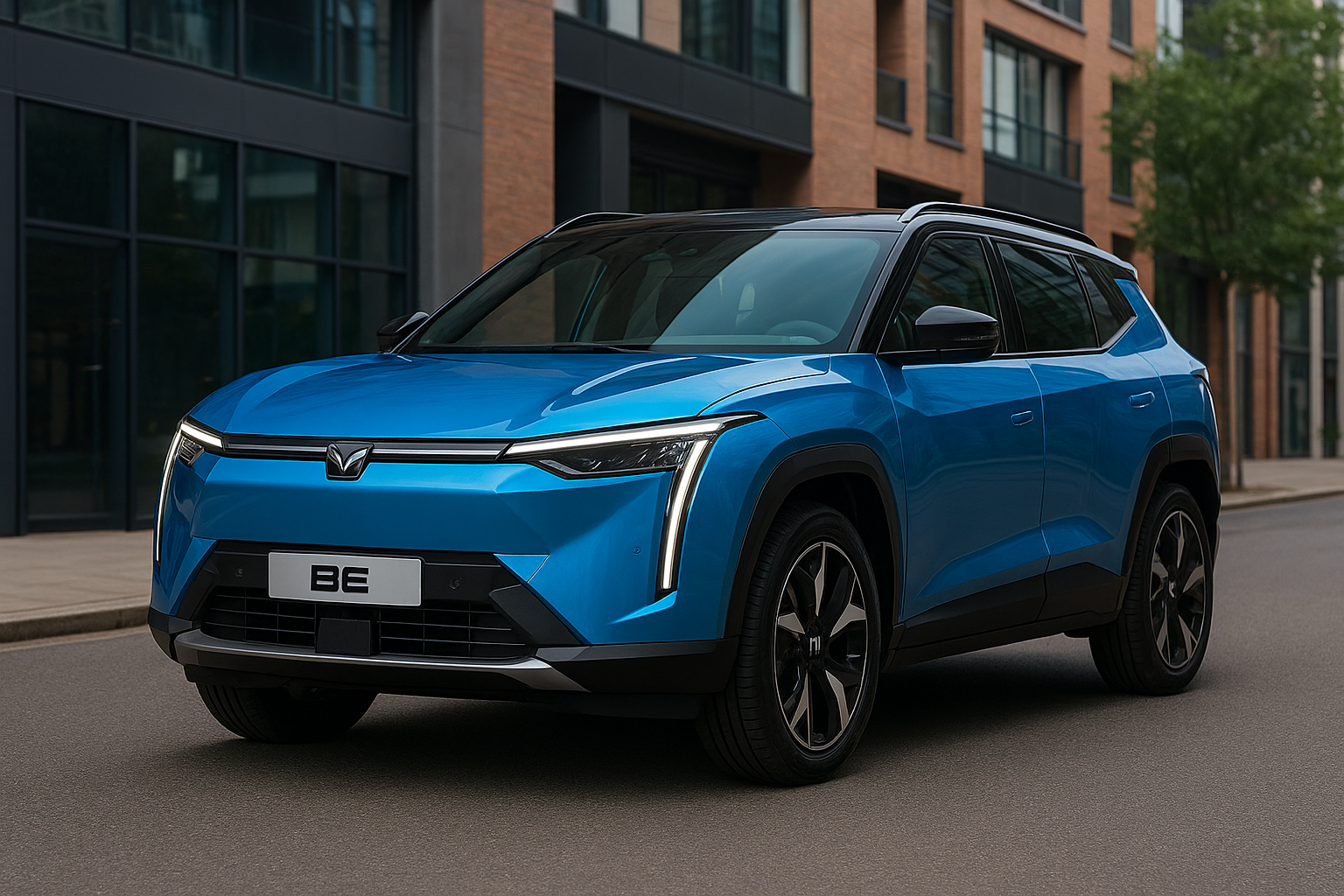
Mahindra’s New Electric SUV: The BE 07 is Here to Make a Splash
Mahindra’s been making some big moves lately, and if you’re a fan of SUVs, you’re going to want to pay attention. The BE 07, Mahindra’s upcoming electric SUV, is creating a lot of buzz in the auto world. Expected to roll out in 2025 or 2026, this electric ride is set to change how we think about electric vehicles (EVs) in India.
We all know Mahindra is famous for its tough, reliable SUVs. The BE 07 will be no different, but it’s got a twist — it’s electric. So, whether you’re looking for an eco-friendly car that still packs a punch or you’re just tired of rising fuel prices, this electric SUV might be exactly what you’ve been waiting for.
Why the BE 07 is Such a Big Deal
The BE 07 is more than just a regular SUV — it’s electric, which means it’s a step forward in Mahindra’s push to make green vehicles the norm. Here’s why people are so excited about it:
1. A Fresh, Modern Look
We all know Mahindra is famous for making rugged SUVs, and the BE 07 keeps that vibe alive. But it’s also got a more modern look that screams future-ready. With sleek lines and a sporty design, it’s got that futuristic appeal, but with all the muscle you’d expect from an SUV.
Whether you’re using it for city drives or heading out on a road trip, the BE 07 will stand out wherever you go.
2. Great Range for Long Drives
One of the things people are most worried about with electric cars is range anxiety — basically, how far can you go before needing a charge? Mahindra is addressing this with the BE 07, which is expected to give you a solid 400+ km on a full charge. That means you can take it on longer trips without the stress of constantly needing to find a charging station. Whether it’s a weekend getaway or a daily commute, this car’s range is more than enough.
And with fast-charging capabilities, you won’t be stuck waiting hours for a charge. Quick and efficient charging will make long drives a breeze.
Tech and Features: It’s Got Everything You Need
Electric cars are all about smart technology, and the BE 07 delivers. The car comes with all the modern features you’d expect from a high-end SUV, but with an electric twist. Expect a huge touchscreen infotainment system, smart connectivity, and advanced driver-assistance features to make your driving experience as smooth as possible.
3. Smart Features for a Smooth Drive
If you’re someone who loves having the latest gadgets in your car, the BE 07 will make you happy. It’ll have features like adaptive cruise control, lane-keeping assist, and emergency braking. These features not only make driving safer but also less stressful, especially on highways or during long drives.
The infotainment system will keep you connected to your music, calls, and navigation, so you’re never without what you need. Plus, all of this tech will be integrated into the car seamlessly, keeping everything easy to use.
Why It’s the Right Time for an Electric SUV
If you’ve been thinking about switching to electric, the BE 07 might just be the right moment. As fuel prices continue to climb, the cost of petrol and diesel is hitting us hard. But with electric vehicles, you’re looking at a much cheaper, more sustainable way to drive.
Plus, government incentives are making it easier than ever to buy an electric car. With affordable pricing and low charging costs, the BE 07 makes going green more accessible than ever before.
Who’s the BE 07 Perfect For?
This car is perfect for families, young professionals, or adventure lovers who want a car that’s tough, eco-friendly, and packed with features. If you love the idea of owning an electric SUV that’s both stylish and practical, the BE 07 is going to be a great fit. It’s spacious enough for your family, but with the kind of performance and luxury that will make every drive a pleasure.
What’s Next for Mahindra?
The BE 07 is just one of the many electric cars Mahindra plans to release. As the company continues to expand its EV portfolio, we can expect even more exciting models in the coming years. The BE 07 is just the beginning of Mahindra’s mission to revolutionize the electric vehicle market in India.
With Mahindra’s growing focus on electric mobility, the future of sustainable transportation in India is looking brighter every day. So, if you’ve been considering switching to an electric car, the BE 07 is worth keeping an eye on.
The Future of Driving Is Electric
The Mahindra BE 07 is shaping up to be an exciting, affordable, and eco-friendly option for anyone looking for an electric SUV. With great design, amazing tech, and a reliable range, it’s clear that Mahindra is stepping up its game when it comes to electric mobility.
If you’ve been thinking about making the switch to electric, the BE 07 could be the perfect vehicle for you. It’s affordable, practical, and it’s got everything you need to drive into a more sustainable future.
Article By
Sourabh Gupta
Blog
Affordable Electric Vehicles: The MG Comet EV and Tata Tiago EV Are Here to Change the Game
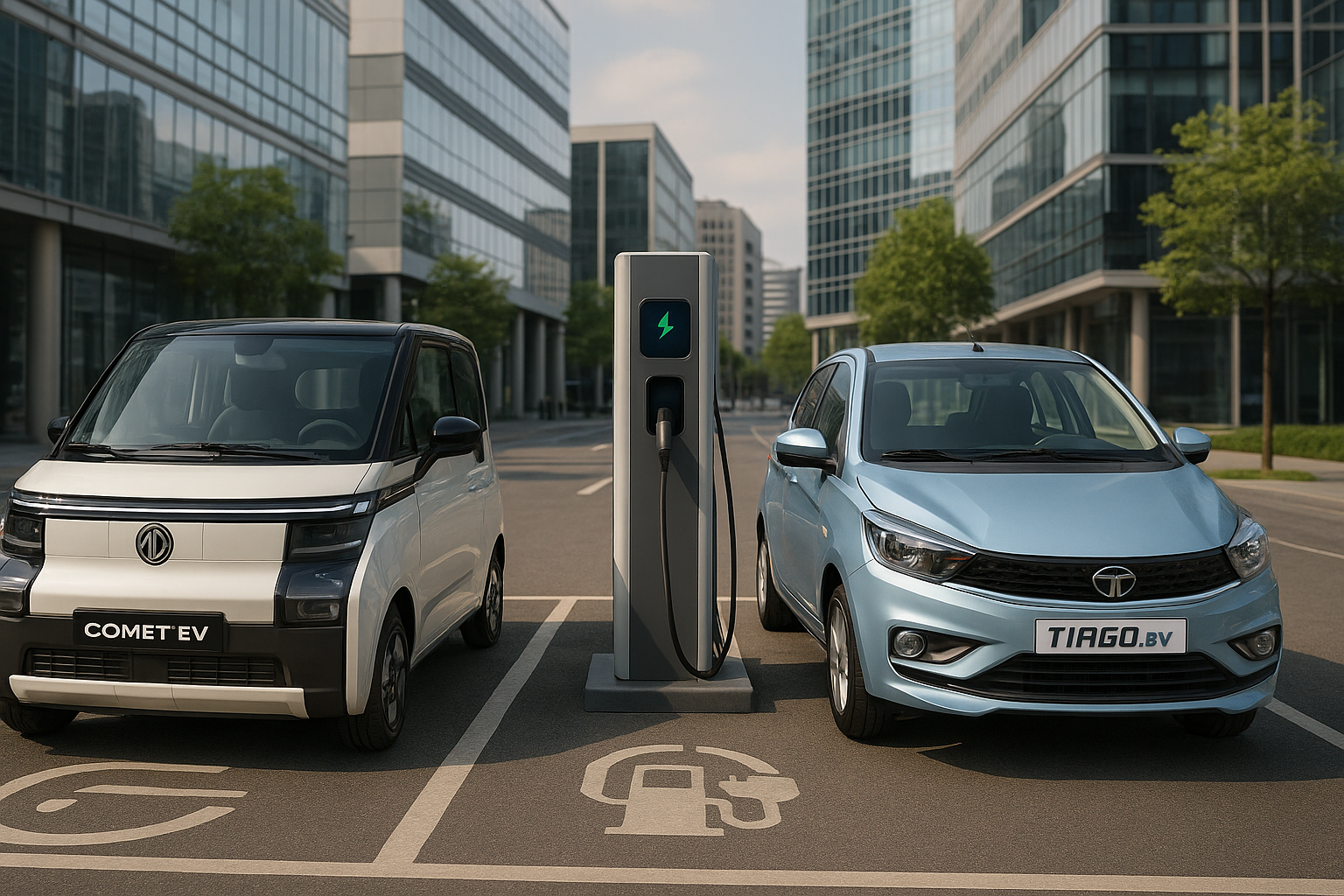
Affordable EVs: Making Electric Cars Accessible for All
The rising price of fuel has everyone looking for a better, more affordable way to drive. And while we’ve been hearing about electric vehicles (EVs) for a while, it’s only now that electric cars are becoming genuinely affordable for the everyday driver. The MG Comet EV and the Tata Tiago EV are two of the most exciting budget-friendly electric vehicles that are making the shift to electric driving much easier. Both of these models will either launch in 2025 or they’re already available in some form, and they’re here to change the way we think about driving green without spending a fortune.
The MG Comet EV: Small, Stylish, and Perfect for the City
If you live in a city, then you know how hard it can be to find a car that’s the right size, doesn’t cost a ton, and also offers the benefits of electric driving. Enter the MG Comet EV. This little car is designed for city life — compact, affordable, and super efficient.
While we don’t have all the details yet, the MG Comet EV is expected to be one of the most affordable electric cars in the market. It’s perfect for people who need a car that’s easy to park, easy to drive, and doesn’t break the bank. Plus, with a smaller battery, the Comet EV is built for urban environments where frequent charging is less of a hassle. And the best part? It’s still packed with cool features like smart connectivity and modern design, proving that an electric car doesn’t have to be boring or basic.
If you’ve been on the lookout for a car that’s practical, affordable, and eco-friendly, the MG Comet EV is shaping up to be a solid option for anyone who wants to drive green without paying luxury prices.
Tata Tiago EV: Bringing a Popular Hatchback to the Electric World
Now, if you’re looking for something that feels a bit more familiar, then the Tata Tiago EV might be your perfect fit. The Tiago has been a fan favorite in India for years — it’s affordable, reliable, and easy to drive. And now, Tata Motors is taking their well-loved hatchback and turning it into an electric car.
The Tata Tiago EV will be available in 2025, and it’s expected to offer great value for money while being an ideal choice for anyone looking to make the switch to electric without spending too much. With an affordable price tag, low maintenance costs, and impressive range, it’s a perfect solution for daily commutes, city driving, or even short road trips.
One of the best parts of the Tiago EV is how much space and comfort it offers for the price. Even though it’s an electric car, you’ll still get plenty of room to stretch out, along with features like smart infotainment, Android Auto/Apple CarPlay, and driver assistance systems to make your ride safer and more enjoyable.
Why Are Affordable EVs the Right Choice for You?
You might be wondering, why should you consider an electric vehicle? After all, the upfront cost of an EV can still seem a little daunting. But here’s the thing — EVs save you money in the long run. With petrol and diesel prices constantly on the rise, the cost of running a traditional vehicle is becoming unsustainable for many people. Electric cars, on the other hand, are cheaper to charge and cheaper to maintain.
For instance, charging an EV is much less expensive than filling up a gas tank. And with fewer moving parts in electric cars, there’s less maintenance needed compared to traditional cars. No more worrying about engine repairs, exhaust issues, or oil changes. Plus, if you add in the government incentives for buying electric vehicles, the cost of owning an EV becomes even more appealing.
A Growing EV Market: More Options Coming Your Way
The affordable EV market is expanding fast. As more car manufacturers like Tata Motors, MG, and others launch electric models, the options for consumers are growing, and the prices are getting more competitive. The MG Comet EV and Tata Tiago EV are just the beginning.
Expect to see more affordable electric cars popping up, with more models to choose from, and all at different price points. This shift will make electric driving even more accessible for people across the country.
The Charging Infrastructure Is Expanding, Too
One of the big questions people have about EVs is the charging infrastructure. If you’ve ever wondered where you’d charge your electric car, the good news is that the charging network in India is growing quickly. Cities like Delhi, Mumbai, and Bengaluru already have plenty of charging stations, and the government is working to expand this network across the country. You’ll also be able to charge your EV at home, which is a huge convenience.
EVs Are More Affordable Than Ever
The MG Comet EV and Tata Tiago EV are two excellent examples of how the electric vehicle market is evolving. These cars are affordable, practical, and eco-friendly, making them perfect for anyone who wants to make the switch to electric without spending a fortune. As the prices of fuel keep rising, electric cars like these are only going to become more attractive.
With more EV options coming in 2025 and beyond, it’s clear that electric vehicles are the future — and they’re becoming more accessible for everyone.
Article By
Sourabh Gupta
-
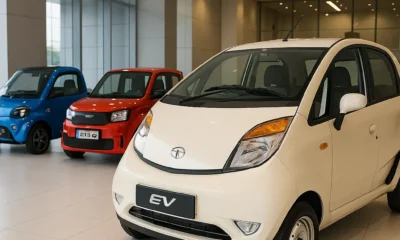
 Blog5 months ago
Blog5 months agoTop Electric Cars in India Under ₹5 Lakhs – Budget-Friendly EVs for Diwali 2025
-
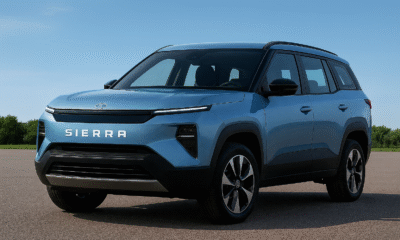
 Blog6 months ago
Blog6 months agoTata Sierra EV 2025 Launch: Price in India, Specifications & First Look
-
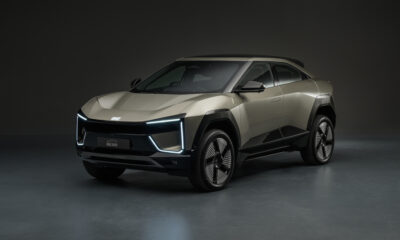
 Blog1 year ago
Blog1 year agoMahindra BE 6 An Intense Move toward the Fate of Electric Versatility
-
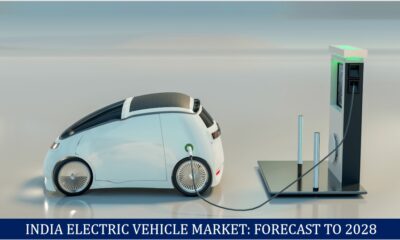
 Blog1 year ago
Blog1 year agoIndia’s Electric Vehicle Market Forecast to 2028 A Rapidly Growing Industry
-
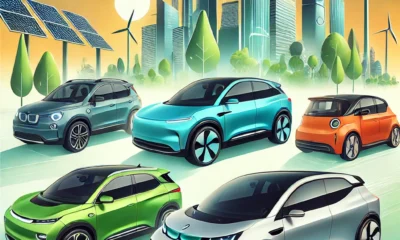
 Blog2 years ago
Blog2 years agoTop 5 best electric vehicles Under $30,000: Affordable Choices for 2024
-
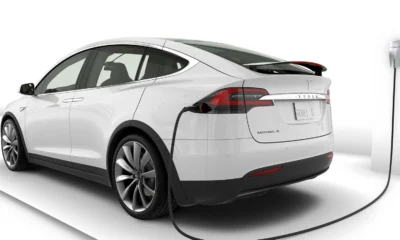
 Blog2 years ago
Blog2 years agoTop 10 Electric Vehicles of 2024: A Comprehensive Guide
-
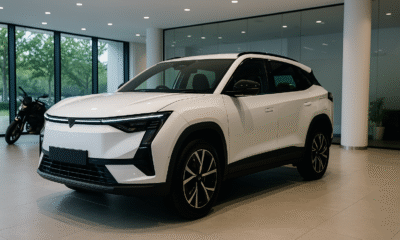
 Blog4 months ago
Blog4 months agoMahindra XEV 9e Launch in November Coming – Detailed Guide
-
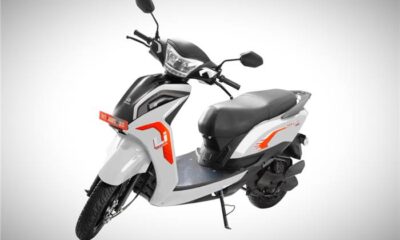
 EV news1 year ago
EV news1 year agoAmpere Magnus Neo Another Time of Electric Portability




